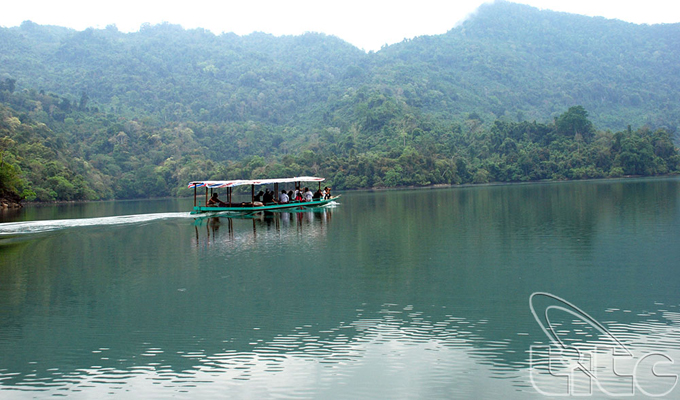Ba Be Lake is the largest natural lake in Viet Nam. Formed approximately 200 million years ago, the lake in the Northern province of Bac Kan is surrounded by limestone cliffs and primary forests.

From Ha Noi, tourists have to travel 230 kilometers to reach the 500-hectare lake. With a fleet of 200 boats able to carry 15 people each at a pier there, tourists can easily book a tour to explore the lake any time during the daytime. The owners of the boats are people of Pac Ngoi Village, which is not far from Ba Be Lake.
While touring Ba Be around this time, tourists can enjoy serenity, flowers and a romantic scene of yellow leaves falling down as well as beautiful old trees by the lakeshore.
There are several spots for tourists to stop by during the tour on the lake. One of them is An Ma Temple.
The temple is where people worship those who were loyal to Mac Dynasty during a civil war between Mac and Le dynasties from 1533 to 1677. Tourists can buy souvenirs and take photos there.
The next stop is Ba Goa (widow) Islet. Legend has it that the islet used to be home of a widow, who split a paddy grain into two parts and turned them into two boats to save people when a flood came.
The 100-square-meter islet has many rocks and many big old trees on it.
Visitors to Ba Be Lake are advised to stay overnight in Pac Ngoi Village, where some 800 Tay ethnic people live and preserve their long-standing traditions by the Leng River.
From the pier, tourists have to walk around 1.5 kilometers to the village. The charming landscape of green paddy fields, trees and flowers on the way will take their tiredness away.
From afar, tourists can see tile-roofed houses in Pac Ngoi Village. There are houses on stilts with electric fans and wifi for guests. They are treated with food specialties of Tay ethnic minority people such as grilled pork, boiled chicken, fried fish and forestry vegetables as well as corn wine.
Visitors to the village should not miss dancing shows performed by Tay women. They dance with fans, bowls and hats.
Back to the pier, tourists will see many shops selling forestry vegetables, tree roots, dried fish and other specialties of the northern province.